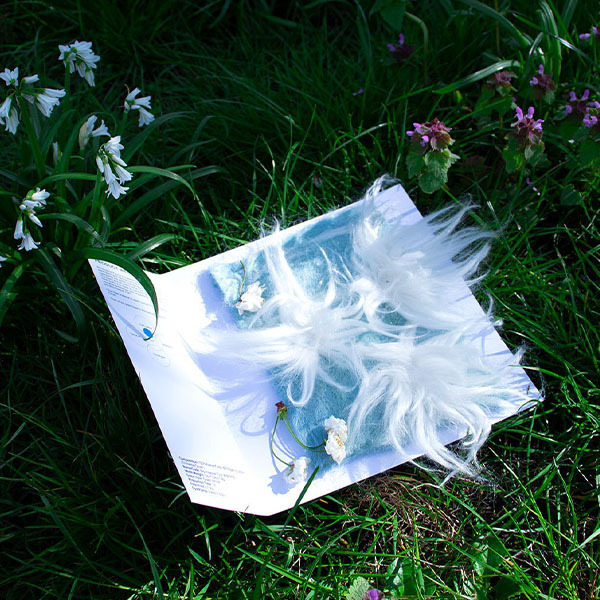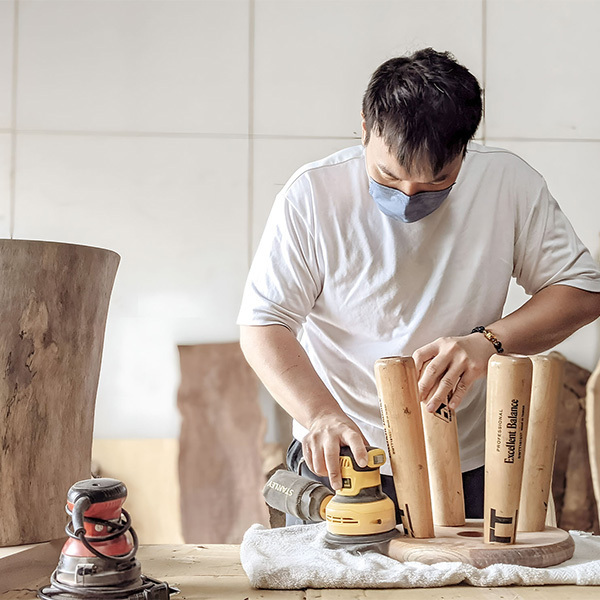Sea vegetable Circulation
SEA VEGETABLE COMPANY
Eleonora Ortolani
Our ever-increasing mountain of plastic waste is an insurmountable problem.
Plastic production is not decreasing and the current system of recycling is failing to keep up.
Guilty Flavours is a radical proposal for how humans can harness our own bodies as machines to eliminate plastic forever – by eating it. New biochemical processes like digestion enzymes could allow humans to safely consume plastic. Starting with vanillin, the molecule of vanilla flavour, my research explores how we can realistically harness this process to create fully edible molecules transformed by living organisms.
Guilty Flavours started as a radical response to a personal frustration around plastic waste recycling. Plastic production is not decreasing, and the recycling system around it cannot keep up, with only a very small percentage of plastic waste actually ending up in a plastic recycling facility. Banning single use plastic still feels like a far, utopian possibility. All of us own an incredibly powerful machine that can make things disappear: our body. Can we use it as a medium to transform plastic waste, and make it disappear for good?
Over time, multiple microorganisms have adapted to the plastic abundance as a new part of their natural environment, especially as their traditional sources of food become scarce. So why have we, as humans, still not thought that way?
The ice cream exhibited is the first real sample of food ever made containing an ingredient transformed from plastic waste: in detail, 20mg of PET plastic were used to flavour the ice cream.
The ice cream is displayed in a locked freezer because, despite its reality in the present time, it still needs to be tested for food safety. This highlights the ethically-controversial nature of evaluating the plastic-derived ingredient: in fact, despite its chemical similarity to the vanillin we already consume, whether natural or synthetic, the testing process is still considering this as a completely new ingredient and a new technology. This underscores the urgency for finding innovative solutions and rapid change in our society and politics of the food system to address pressing environmental issues.
Therefore, the ice cream will be locked and frozen until we, as humans, will make a decision on what to do with it. This is real and ready now, but are we?
This project has garnered global attention, transcending the confines of the art world and igniting conversations that extend far beyond traditional artistic spheres. It has successfully engaged audiences worldwide, capturing their attention and sparking discussions on a wide scale about microplastics, future of food, food politics and waste management.
Faculty Chair and Former Vice President of Community and Impact, Singularity University
We live on the cusp of using biotechnology to rebuild and redesign our world. While this holds great promise for solving environmental and social challenges, it also raises new questions. What is natural and unnatural? What is biological and what is material? What is healthy and unhealthy? What are the consequences of changing things? What are the consequences of not changing things? How much risk should we take? How much risk should we ask others to take? How do we not fear a future very different than our past? This project gently introduced these questions to the viewer. While much of the world engages in polarizing and destructive debate around technology and ethics, this project shows there is another way. We can experience and see possibilities for change and our future, while also remaining completely safe. I hope Eleanora will create other projects at the intersection of technology and ethics that allows more people to gently and safely explore the choices of our future.
Osaka Namari-Suzu Seirensho Co., Ltd. President and CEO
A speculative art project that makes us have a good hard stare through the looking glass, this projects also has parallels with purifying sewage water for drinking, an unsavory but soon to become reality. To many, the concept itself (our waste as our nutrition) may be distasteful, but as a society, we have to admit that microplastics are already appearing in our food-chain and in our bodies.
The historical, socio-political and biotechnological aspects of the vanilla bean makes the choice of vanillin very appropriate, given the themes raised, "natural : artificial" intertwined with “mass produced : scarcely sourced”. The ubiquitous presence of vanillin has rendered the rare vanilla (bean-derived) to mean bland, common, basic. The petrochemically-derived vanillin as "vanilla" replaced the precious vanilla bean resulting in mass-consumption of vanilla aroma and flavours. Now people are trying to make biotechnological super-beans to make vanillin to swap out the petrochemicals.
If the PET-generated vanillin were super rare, only made in small quantities, will it have the preciousness of the original vanilla bean, even if the origins can be traced to petrochemicals? Or do we industrialize this process to produce the vanillin that has made the once precious vanilla, a common ingredient in our sweets? The fact that PET-derived vanillin can be industrialized raises philosophical questions and eybrows. Why does society always want to produce so much? To what extent do we want to pursue pleasures so that they become banal?
Architect, Founder of NARUSE・INOKUMA ARCHITECTS Co., Ltd.
This project packs a powerful message: we should not lose sight of the fact that we have no way to dispose of plastic waste. What if we as human beings ate the plastic? In asking this question, the project is really trying to challenge the status quo. Even if the prototype ice cream can't solve all our problems, it works to broaden and deepen our thinking. While we all need to recycle plastic and reduce plastic use, this project shows us the importance of taking a different view of the problem.
FabCafe Barcelona CEO
Guilty Flavours presents a revolutionary and experimental concept that reimagines the plastic waste problem through a radical yet intriguing lens. The project's vision of harnessing biochemical processes to convert plastic into edible substances is not just a creative endeavor but also a pragmatic solution to the global crisis of plastic pollution and a fundamental alteration of our relationship with plastic. The project has the potential to foster a new trend in research where we explore if we can transform what we previously considered harmful into new feasible solutions.

Fair, circular solar panel
Biosphere Solar
MATR
MATR
TATAMI ReFAB PROJECT
HONOKA
Dodola
Pjorkkala
re:Mix, the circular kitchen mixer for your own glass jars
Open Funk
CirculaRElectronics by VERTMONDE
VERTMONDE ECUADOR
MateRe - DPP
digglue. inc
Transparent Solar Windows
VP for Ubiquitous Energy
Project "TSUMUGI"
General Incorporated Association Upcycle
The Mother Reef
Oyster Heaven
Anam PALF® by Ananas Anam
Ananas Anam
DiFOLD Origami Bottle
DiFOLD
Co-producing value-added, biodegradable plastics and additives from agricultural byproducts
Ourobio
Infinity Toy Box
Infinity Toy Box
Lichens as an bioindicators of "Well-being"
Yixuan Wang (collaborated with Julio Obscura)
Tejiendo la calle
Tejiendo la calle
comvey Share-Bag
Comvey. Inc. CEO
Creating a sustainable society. "Circular Action in daily life"
株式会社ECOMMIT ブランド戦略部 広報ブランディンググループ 所属
Hair Recycle
Dung Dung asbl
Lalaloop Reusable cup system for a circular city
OysterAble co., ltd.

Bio-invasive Textile Library
Bio-invasive Lab Ltd/ Central Saint Martin-Ma Biodesign
MateRe
digglue inc.
Briiv Air Filter
Five Create Ltd.
Gravity Wave - Plastic Free Oceans
GRAVITY WAVE
Seaweed Dialogues
Alberte Holmø Bojesen
Somewhere, Sometime
obake
